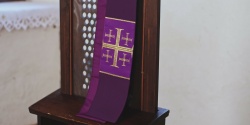Published: 19.10.2022

· The European Court of Human Rights found that French courts violated the right to freedom of speech of a feminist who stripped half-naked in St. Magdalene in Paris.
· In 2013, Eloïse Bouton, an activist in the radical feminist organization Femen, parodied the attitude of the crucified Christ in front of the altar.
· As she later explained, she wanted to express her opposition to the Catholic Church's position on abortion by doing so.
· French courts, led by the highest court, unanimously recognized the feminist's behavior as a violation of the rights of believers and sentenced her to a suspended month in prison and 2,000 prisoners. euro in compensation for the parish.
· The European Court of Human Rights found, however, that the courts had violated the woman's right to freedom of speech and awarded her a sum of PLN 9.8 thousand. euro (about PLN 47 thousand).
In 2013, Eloïse Bouton, accompanied by a group of journalists, entered the Church of St. Magdalene in Paris, took off her shirt showing her naked breasts and demonstratively stood with her arms outstretched in front of the altar, parodying the posture of the crucified Christ. She had left-wing slogans in support of abortion written on her body and chunks of raw beef in her hands. Shortly thereafter, a manifesto with photos from the incident appeared on the Femen website, stating that "Christmas is canceled from the Vatican to Paris, and on the altar of St. Magdalene, Holy Mother Eloïse aborted Jesus”.
The parish priest submitted a notification to the prosecutor's office, which accused the woman of committing the crime of sexual exhibitionism in a public place. In the proceedings, the woman defended that her act did not constitute a crime, because "she does not consider her breasts to be objects of a sexual nature". In addition, she emphasized that her intention was to contribute to the public debate on abortion. In 2014, a criminal court in Paris sentenced a woman to sexual exhibitionism, imposing a suspended sentence of one month in prison, 2,000 Euro compensation for the parish of St. Magdalena and 1.5 thousand. euro by way of reimbursement of the costs of the proceedings. In 2017, the appellate court upheld the conviction, and in 2019, the Court of Cassation finally closed the case, rejecting the cassation appeal of the accused. All the courts emphasized that the punishment was not a sanction for the accused's views on abortion, but for indecent behavior in a place of religious worship where the faithful should not be disturbed in practicing their religion.
In 2019, Eloïse Bouton lodged a complaint with the European Court of Human Rights, alleging a violation of her right to freedom of expression (Article 10 of the Convention). In recent days, the Tribunal in Strasbourg upheld the complaint, awarding Bouton the sum of PLN 9.8 thousand. euro (approx. PLN 47 thousand), including 2 thousand. euro as compensation and 7.8 thousand. euro by way of reimbursement of the costs of the proceedings. In the statement of reasons for the judgment, the Court pointed out that the French courts had failed to take sufficient account of the fact that the applicant's indecent behavior "was in fact intended to convey, in a symbolic place of worship, a message about the role of the Catholic Church in the sensitive and controversial issue of women's right to decide your body, including the right to abortion ”. The Tribunal emphasized that "it was moved by the severity of the sentence" imposed on the woman.
- This is another judgment in which the Tribunal in Strasbourg lowers the standard of protection of the rights of Christians, guaranteed in Art. 9 of the Convention, against primitive and vulgar verbal attacks. For several decades, the Tribunal has consistently ruled that freedom of speech does not include the right to proclaim the so-called unproductively offensive statements that add nothing to the debate but merely humiliate believers. Recently, however, the Court has started to gradually distance itself from this position, taking into account the complaints of celebrities and activists about the symbolic penalties imposed on them by the domestic courts for insulting the Christian religion. In the light of the latest jurisprudence of the ECtHR, it seems permissible to offend Christians not only in the press, but also in their own places of worship. It remains to be hoped that the French government will exercise the right to appeal against the last ruling to the Grand Chamber of the Tribunal, stressed Weronika Przebierała, Director of the International Law Center of the Ordo Iuris Institute.
The case of Bouton v. France, ECtHR judgment of October 13, 2022.

09.04.2025
• On April 8, the Ordo Iuris Institute presented the Polish version of a document with proposals for reforming the European Union, prepared jointly with Hungary’s Mathias Corvinus Collegium (MCC).

08.04.2025
Sixth Court Hearing Ends Without Progress

07.04.2025
In response to the liberal left’s self-proclaimed “militant democracy” in Poland and

04.04.2025
• Over 30,000 signatures were submitted by the Ordo Iuris Institute and the Center for Life and Family urging President Duda to veto the “hate speech” law passed by the Polish parliament on March 26.